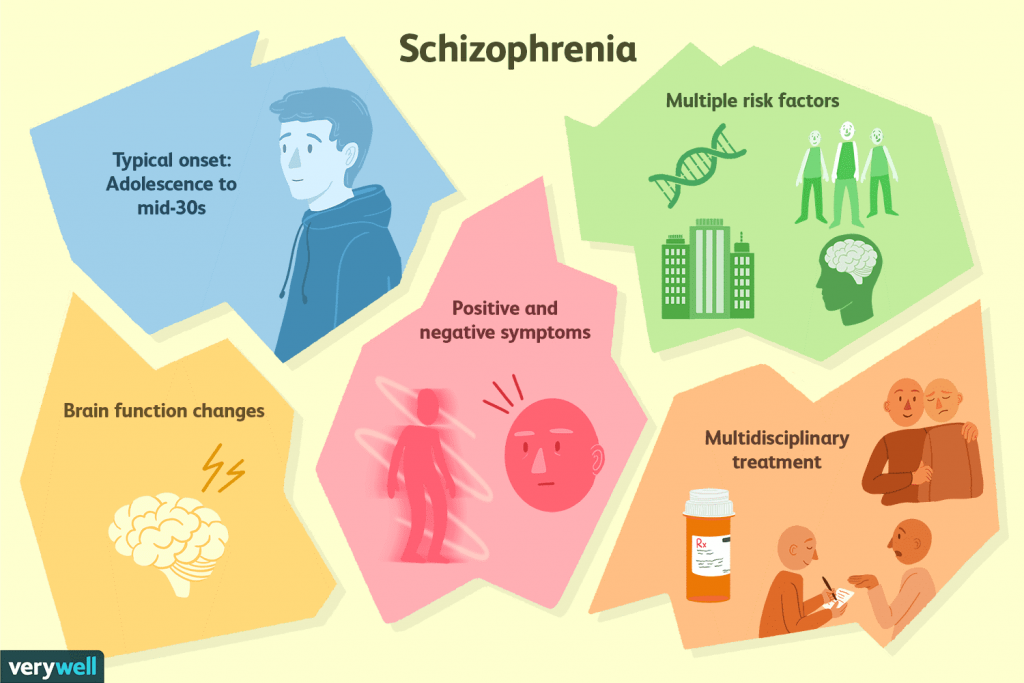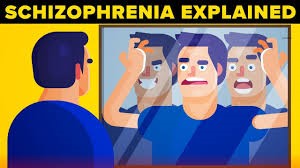By Eryn Hasty
Schizophrenia is a mental disorder that causes a person affected by it to have a difficult time determining a difference in reality from delusions. Sufferers of schizophrenia have numerous mental struggles including delusions, hallucinations, disorganized thinking and speech, abnormal motor behaviors, and lack of proper self-care or emotion (3). Schizophrenia is not very prevalent in the human population, with only about a 1% of the world population diagnosed in the world and 1.2% of the United States population diagnosed (5). There have been numerous studies conducted regarding Schizophrenia, and it’s genetic components, but the amount of SNPs that have been believed to be associated with the mental disorder is through the roof. More recent studies have linked variations in approximately 20,000 different SNPs that influence the development of Schizophrenia (6). Other genetically related diseases typically do not have such a broad SNP range.
A recent study has determined that the SNPs rs13194504 and rs210133 have an impact on the development of schizophrenia. More specifically, the signal found between these two SNPs is what could be the culprit. The C4A and C4B alleles found in this region can form different structures among different humans creating varying amounts of C4A expression in a person’s genome. Researchers determined that a higher risk of Schizophrenia is related to a greater expression of this C4A allele, and a maximum relative risk documented at this time is 1.27. The reason is because C4A expression deals with synaptic pruning in the brain (6). Synaptic pruning is the natural removal of synapses, structures that allow the transmission of neural signals, from the brain. Pruning of the brain typically begins during early childhood and lasts into late teens or early adulthood (1). With excessive pruning, those with schizophrenia have less synapses in their brains compared to those without schizophrenia. With schizophrenia being a neurological disorder, the reduction in neural connections makes sense as to why those diagnosed with schizophrenia have such abnormal and delusional mental processes. Another factor that makes sense, the timeline of typical schizophrenia diagnoses occurring around adolescences, which would be about the same time the excessive synaptic pruning becomes noticeable.


With so many factors that influence Schizophrenia, is it really worth it to get genetically tested for Schizophrenia? In my opinion, no. The reason is that there is not a specific gene, or even 100 specific genes, that are widely recognized as the contributor to Schizophrenia. As stated above, there are over 20,000 SNPs that have variations believed to contribute to development of schizophrenia. Now, if someone were to insist they be tested I would suggest a few methods based on how much information they are looking for. If they want to know if they have even the tiniest variation in any of the SNPs associated with Schizophrenia, then I would have to tell them they need a whole genome sequence done. As of 2014, this will cost approximately $1325. With this done then the person has access to all of their SNPs, including all 20,000 that have previously been correlated to Schizophrenia development, but this will most likely be of little value to the average person. My best recommendation for those who do not want to an entire genome sequence done would be to have specific testing done on the most prevalent genes such as the structure of the C4A allele mentioned above. The Human Exome consortium has developed and is still improving a schizophrenia-oriented SNP chips based on genomes of those previously diagnosed with schizophrenia. These chips test a handful of SNPs commonly linked to Schizophrenia. A SNP chip typically costs around $300, which is much more reasonable. Again, genetic testing may not share a lot of information as the cause of this mental disorder has so much variation, so most testing is not reliable when it comes to determining the schizophrenia trait.
Scientifically, taking genetic tests to try and determine this are not very reliable and useful. For example, just because someone has more or less C4A alleles than someone else does not necessarily mean that they will have significant synaptic pruning to cause neurological problems. The Indiana University School of Medicine wrote an article regarding their new test that may predict risks of schizophrenia. The test measures your C4A allele and the synapses in a persons brain and uses it to determine a possibility of schizophrenia, but even the scientists studying stated, “…[the test] doesn’t determine your destiny. It just means that your neuronal connectivity is different, which could make you more creative, or more prone to illness.” (4). This statement is the pure definition of genetic test results: unknown. Just because someone has more or less synapses in their brain that does not necessarily mean it is going to be a negative effect. Everyone has brain variation, and only 1% of the population actually has schizophrenia. This test may cause unnecessary stress in a person’s life if they are found to have a certain allele that may cause problems, or the have a few less synapses than the person next to them. On the other hand, Schizophrenia is so mysterious genetically that just because they appear to have a “clean genetic health” a person could still develop a disease such as Schizophrenia.
Emotionally, genetic testing, especially for something as serious as schizophrenia, is most likely just going to cause unnecessary stress in someone’s life should they test positive. The Genetics Home Reference explains that most risks that do come from genetic testing are related to emotional, social, and financial outcomes (9). A major issue that is often not thought about is how genetic testing affects other members of the family. If a parent of multiple children has schizophrenia and one child wants to be tested while another does not this could cause issues after results are received. If the results come back with bad news, this could cause tension and stress in the life of the sibling who did not want to be tested. They know their sibling has higher risks, therefore they might as well (9). There are also ethical concerns regarding the publication of research and the right to personal health privacy through genetic testing. There are currently no “safeguards” on sharing data from patients (7). Also, if one family member is willing to share genetic information while another is not, who wins the battle? This major issue arises more frequently than not, and there are numerous debates on the importance of sharing genetic data while also protecting a patient and his/her family (7).
With that being said, family history is a major factor that determines a person’s decision to get genetically tested for certain diseases. The reason I chose to research Schizophrenia is because my great grandmother suffered from psychosis and I believe was eventually diagnosed with Schizophrenia. Growing up I did not know this about her and did not find out until years after her passing. This sparked my interest in the disease as if genetically linked I could carry the gene. According to Schizophrenia.com, the base risk for this gene is 1%, but with one diagnosed parent, the offspring has a 10% chance of inheriting the disease. As someone who has schizophrenia in the family, I still feel as though 10% is fairly low, and since it has not been seen in generations since I feel the need to get tested is not necessary. I also feel this because schizophrenia is so difficult to read genetically. If this were another disease that is much easier to determine based on genetics, then it might be a different story. I would recommend to those who believe they are at risk to diagnose and treat as early as possible. Seeking psychiatric services will allow for an early diagnosis which allows for an early treatment. Medications and therapy allow those who suffer from schizophrenia to manage their symptoms and live close to normal lives (3).
Should a person choose to get tested, they must prepare for their results, and remember to take both a positive and a negative with a grain of salt, as results could still be inaccurate. If tested positive, or more likely to develop, a person should consult with their doctor regarding medications, treatments, stress management techniques, etc. so they are prepared and ready to battle schizophrenic effects should they arise. A few environmental factors should be taken into consideration such as decreasing use of hallucinogenic drugs such as cannabis, as well as refraining from stressful activities. Other than that, it is recommended to go on living life as usual because as said before, genetic testing for this disease is unreliable.
All in all, Schizophrenia is one of the trickiest genetic diseases to study and test. It has so many different genetic and environmental factors that makes the process of determining genetic likelihood and even diagnoses difficult. Hopefully, in years to come we can find a more definite genetic test or cause of this mental disorder, so there are less questions. For now, our society will have to continue researching and working towards finding clearer answers while understanding the ineffectiveness and unreliability that comes with genetic testing for Schizophrenia.
Sources
(1) Cafasso, J. (2018, January 3). Healthline: What Is Synaptic Pruning? Retrieved from https://www.healthline.com/health/synaptic-pruning.
(2) Hickman, R. J. (2019, August 6). An Overview of Schizophrenia. Retrieved from https://www.verywellmind.com/schizophrenia-what-you-need-to-know-4156588.
(3) Mayo Clinic. (2018, April 10). Schizophrenia. Retrieved from https://www.mayoclinic.org/diseases-conditions/schizophrenia/symptoms-causes/syc-20354443.
(4) Rattue, G. (2012, May 19). Genetic Test May Predict Risk Of Schizophrenia. Retrieved from https://www.medicalnewstoday.com/articles/245591.php#2.
(5) Recovery Brands, LLC. (2019). Schizophrenia Symptoms, Patterns and Statistics and Patterns. Retrieved from https://www.mentalhelp.net/schizophrenia/statistics/.
(6) SNPedia. (2017, October 20). Schizophrenia. Retrieved from https://www.snpedia.com/index.php/Schizophrenia.
(7) Takashima, K., Maru, Y., Mori, S., Mano, H., Noda, T., & Muto, K. (2018, June 18). Ethical concerns on sharing genomic data including patients’ family members. Retrieved from https://www.ncbi.nlm.nih.gov/pmc/articles/PMC6006763/.
(8) The Infographics Show. (2019, March 24). Why Do People With Schizophrenia See Things (Schizophrenia Explained)? Retrieved from https://www.youtube.com/watch?v=MN3BpNT8xqc.
(9) What are the risks and limitations of genetic testing? – Genetics Home Reference – NIH. (2019, November 26). Retrieved from https://ghr.nlm.nih.gov/primer/testing/riskslimitations.
